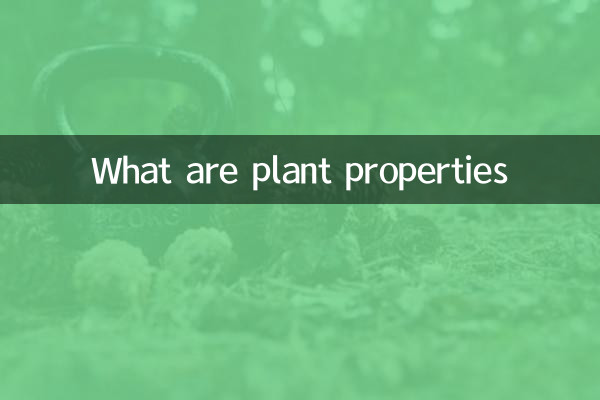What are plant properties
Plant attributes refer to the characteristics and classification basis of plants in terms of growth, form, function, etc. Understanding plant attributes not only helps us better understand the plant world, but also provides scientific basis for agricultural production, ecological protection, etc. This article will combine the hot topics and hot content on the Internet in the past 10 days to deeply explore the definition, classification and application of plant attributes.
1. Basic definition of plant attributes

Plant attributes usually include plant morphological characteristics, physiological functions, ecological adaptability and other aspects. For example, plant height, leaf shape, flower and fruit characteristics, etc. all belong to the category of plant attributes. These properties not only determine the appearance of the plant, but are also closely related to its survival strategy.
2. Main classification of plant attributes
Plant attributes can be classified from multiple perspectives. The following are common classification methods:
| Classification dimension | specific attributes | Example |
|---|---|---|
| Morphological properties | Height, leaf shape, root structure | Trees, shrubs, herbs |
| Physiological properties | Photosynthetic efficiency, water utilization | C3 plants, C4 plants |
| ecological attributes | Drought tolerance, cold tolerance, soil adaptability | Desert plants, wetland plants |
3. Plant attributes among hot topics on the Internet
In the past 10 days, hot topics related to plant attributes have mainly focused on the following aspects:
| hot topics | Related plant properties | heat index |
|---|---|---|
| New species for urban greening | Stain resistant, low maintenance | 85% |
| Plant adaptability under climate change | Drought tolerance, high temperature resistance | 78% |
| Progress in Research on Medicinal Plants | Chemical composition, growth cycle | 72% |
4. Practical application of plant attributes
Plant properties have important application value in many fields:
1.agricultural production: By analyzing the physiological attributes of crops, planting plans can be optimized and yields increased. For example, choosing drought-tolerant crop varieties suitable for the local climate can reduce water consumption.
2.ecological restoration: In the restoration process of degraded ecosystems, selecting plant species with strong ecological adaptability is key. For example, salt-alkali-tolerant plants can be used to improve saline-alkali soil.
3.garden design: Based on the morphological attributes and growth habits of plants, a more beautiful and sustainable garden landscape can be designed.
5. Future directions of plant attribute research
With the development of science and technology, research on plant attributes is developing in the following directions:
1.Gene level research: Through gene sequencing technology, we can deeply explore the genetic basis of plant attributes.
2.artificial intelligence applications: Use machine learning algorithms to quickly identify and classify plant attributes to improve research efficiency.
3.interdisciplinary integration: Combine the study of plant attributes with climatology, soil science and other disciplines to explore a more comprehensive plant-environment interaction mechanism.
Conclusion
Plant attributes are an important window for understanding the plant world and the scientific basis for the harmonious coexistence between humans and nature. By continuing to research and apply knowledge of plant properties, we can better address global challenges such as climate change and food security.

check the details

check the details